Sustainable travel: tourism operators reducing or ending plastic use, and taking other steps to safeguard the environment
- Companies and communities that make a living from attracting tourists to Asian beauty spots are taking steps to reduce their impact on the environment
- Many are striving to end their reliance on single-use plastic, while others are working to safeguard or restore coral reefs

The tourism industry has a huge role to play in protecting and preserving the environments it encroaches on. Scenes of once-pristine beaches strewn with waste and translucent waters peppered with plastic have forced the companies and communities who make a living from tourism to take action.
With this month being Plastic Free July, we throw the spotlight on some of the organisations taking steps to safeguard the environment.
1. Banyan Tree Samui
The Thai islands of Koh Samui, Koh Phangan and Koh Tao have in recent years introduced bans on smoking and littering on beaches, feeding marine life, waste water dumping, anchoring or fishing on coral reefs, walking on the seabed, and seaside construction. Meanwhile, tourists are banned from bringing plastic bags to another island, Koh Samet.

Banyan Tree Samui is the country’s first resort to be awarded Gold Certification by international tourism advisory group Earthcheck. Housekeepers use cloth bags instead of plastic ones, its restaurant uses wooden and bamboo utensils, and most plastic bottles have been replaced by glass bottles.